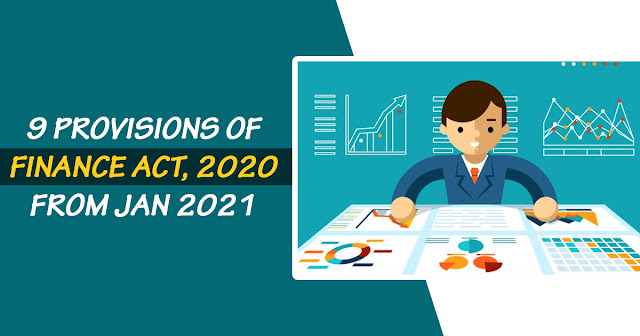In a notification released last week, the Central Board of Indirect Taxes and Customs (CBIC) has said that 9 Provisions of Finance Act, 2020 will be officially effective from 1 January 2021. In other words, 1 January, 2021 has been finalized as the date from which the provisions of sections 119, 120, 121, 122, 123, 124, 126, 127 and 131 of the Finance Act, 2020 shall be enforced by the board.
9 Provisions of The Finance Act, 2020
The provision of Section 119 intends to add the words “or services” after the words “or goods” in section 10 of the CGST Act.
The provision pertaining to Section 120 will omit the words “invoicing relating to such” from section 16(4) of the Act.
The provision of Section 121 says that a taxable person is no longer mandatorily required to register under section 22 or section 24 and can opt out of voluntary registration made under sub-section (3) of section 25.
Section 122 provision has been introduced to make an amendment in section 30 of the CGST Act, “Provided that such period may, on sufficient cause being shown, and for reasons to be recorded in writing, be extended, by the Additional Commissioner or the Joint Commissioner, as the case may be, for a period not exceeding thirty days; by the Commissioner, for a further period not exceeding thirty days, beyond the period specified in clause (a).”
The new provision of section 123 will amend the provision of section 31 of the CGST Act, which concerns the time of supply of goods under GST.
Section 124 provision seeks an amendment in section 51 of the Central Goods & Services Tax Act, which is related to the TDS provisions.
Section 126 provision of Finance Act, 2020 suggests amendment in section 122 of the CGST Act that deals with offences and penalties.
The provision of Section 127 seeks to amend section 132 of the CGST Act, which concerns the rights of the GST authorities to arrest the taxpayers.
Section 131 provision says that In Schedule II to the Central Goods and Services Tax Act, the words to Schedule II “whether or not for a consideration” at both places where they occur in paragraph 4, shall be considered removed, effective from 1 July, 2017.


Comments
Post a Comment